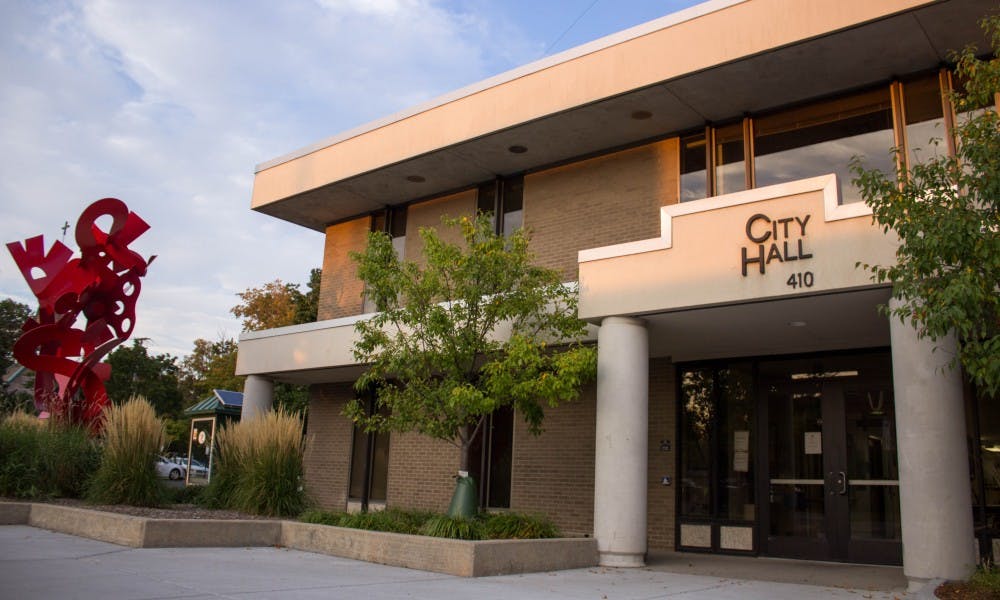Tuesday's city council meeting was a busy one, with members approving the budget for the next year with a surprise amendment. Here are the main takeaways:
2019 budget approved

East Lansing City Hall pictured on Sept. 12, 2017, on Linden Street. Here, the City Council meets to discuss residents' concerns.
Tuesday's city council meeting was a busy one, with members approving the budget for the next year with a surprise amendment. Here are the main takeaways:
2019 budget approved
After months of discussion and public input, councilmembers approved the budget, tax rate and fee schedule for fiscal year 2019 by a vote of 5-0.
Councilmember Aaron Stephens moved the only amendment to the budget, in order to provide $52,000 in additional Community Development Block Grant (CDBG) funding to social services. That motion passed 3-2.
CDBG funding is federal money, restricted to projects that would benefit the city's economically disadvantaged citizens. The preliminary 2019 budget allocated it solely to pay down the city's Avondale Square loans and make sidewalk and other infrastructure improvements.
The city initially elected to cut all CDBG funding to social services at its April 17 budget work session.
Mayor Mark Meadows said he received a letter from federal Department of Housing and Urban Development informing the city of the additional CDBG money available on May 15, the same day of the last budget work session.
Councilmember Shanna Draheim, who supported the amendment, said hers would likely be a one-time vote.
Given the surprise nature of the additional funding and the severity of the city's budget troubles, she said she was unlikely to approve a similar amendment to preserve social services funding in the future. Other councilmembers made similar comments during the meeting.
Mayor Pro Tem Erik Altmann, who voted against the amendment alongside Meadows, said he had a problem with the last-minute nature of its introduction, but that the budget was too important to reject in total because of it.
Check back with the State News for a detailed breakdown of the approved budget and how it will impact residents.
Before the amendment: A call for social services funding
Long before the budget vote, councilmembers and residents spent nearly an hour discussing the city's budget crisis and its impact on residents. Meadows said the budget and related topics had inspired many emails to councilmembers in the run-up to the budget vote.
As of the start of the meeting, 40 written communications had been received, many of which dealt with funding for the Haven House homeless shelter.
Gabriel Biber, executive director of Haven House, urged the council to amend the budget to restore funding for social services during the meeting's public comment session.
"Please don't sell out those most vulnerable among us to protect the general fund from the speculative fear of potential decreased CDBG funding in the future," Biber said.
Biber's concerns were eventually rendered moot with, as noted previously, the adoption of the amendment securing funding for social services.
Obligatory income tax discussion
Councilmembers used the "communications from council" portion of the meeting to clarify the new income tax effort slated for the Aug. 7 ballot, and to speak to misconceptions about it.
Besides the tax, the city doesn't have any other options other than to continue with the necessary cuts established through this year's budget discussion process, Meadows said.
Support student media! Please consider donating to The State News and help fund the future of journalism.
There is a concern that continued cuts deemed financially necessary could decimate public safety to the point that it could encourage crime, the mayor said.
"When we go below one [officer] per 1,000 [residents], we are putting our community in a dangerous situation," Meadows said. "Luckily we're a very safe community, but I also believe that crime is something that looks for an opportunity, that looks a vacuum that's created."
Meadows added that he would not believe in such extreme measures as heavy cuts to public safety, potentially closing the Hannah Community Center or shuttering any other popular institutions if other revenue streams were available to the city -- heavily alluding to a desire to see the income tax pass.
Altmann echoed Meadows, saying that nobody wants to close Hannah or make cuts to "basic services" like public safety, but that it would be a necessity without new revenue coming in.
Altmann used his time to clarify the differences between the new income tax and the one that failed in November, namely how it is time-limited to 12 years and would go toward specific causes like the pension debt and infrastructure improvements.
Draheim said she has heard rumblings from residents that the city should opt to declare bankruptcy rather than cut services or implement an income tax.
Calling it a "short-sighted sentiment," she said bankruptcy or the appointment of an emergency manager by the state would go against the best interests of the city and what most residents want to see in East Lansing.
Stephens and Beier largely echoed their colleagues, with Stephens explicitly calling for residents to vote for the tax in August.